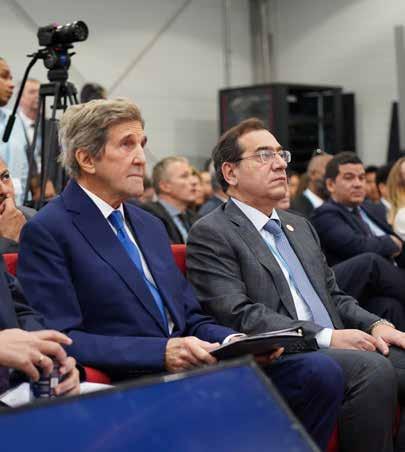
2 minute read
EFFORTS
SECTOR’S STRATEGY
The oil & gas sector is working through a strategy where energy transition and emission reduction are major parts. Accordingly, the sector has adopted a vision and plan to convert to low-carbon energy sources and reduce carbon emissions through strategic pillars which are represented in energy security, financial sustainability, and governance of the sector.
Advertisement
Strategic Pillars
1. Energy Security
» Boost energy supply
» Diversify energy supply
» Optimize the energy demand
» Promote decarbonization activities
2. Financial Sustainability
» Address historic arrears & financial interdependencies
» Reform energy subsidies
» Maximize value added from oil & gas
» Monetize decarbonization opportunities
3. Sector Governance
» Improve sector governance & organizational structure
» Capitalize on the sector’s human capital
» Attractive climate investment
» Unified sector-wide focus on decarbonization
Decarbonization Key Pillars
Within the framework of the oil & gas sector's strategy for energy transition and emissions reduction, the sector adopts a plan to support decarbonization according to the following six main pillars.
1- Energy Subsidy Reform
2- Low Carbon Natural Gas as a Complement to Renewable Energy
3- Improve Energy Efficiency
4- Decarbonization
5- Renewables & Bioenergy
6- Hydrogen
ENERGY EFFICIENCY & EMISSIONS REDUCTION ACHIEVEMENTS
The oil & gas sector succeeded in completing projects to reduce CO2 emissions in addition to entering into partnerships with foreign partners to implement the sector’s strategy.
In parallel with executing projects to reduce emissions, the MOPMR signed agreements and entered partnerships to achieve the sector’s strategy, including:
» Implementation of the first campaign to study the measurement of methane emissions in the sector's companies in cooperation with the European Bank for Reconstruction and Development (EBRD).
» Signing a joint declaration of intent with the Federal Ministry for Economic Affairs and Climate Action and the Federal Ministry for Economic Cooperation and Development of the Republic of Germany for cooperation in the field of green hydrogen.
Cop27 Decarbonization Day
Egypt's oil and gas sector succeeded in organizing the first ever "Decarbonization Day" as part of the official thematic days at COP27. This was the first time ever in COP summits that those who participated in COP27 had the opportunity to take part in Decarbonization Day, a day that not only seeks to highlight the importance of decarbonization as a cause but was a clear demonstration of Egypt’s firm commitment to achieving the objectives of the Paris Agreement while pushing for a just energy transition.

Decarbonization Day was opened by H.E. Tarek El Molla, Minister of Petroleum and Mineral Resources, H.E. John Kerry, U.S. Special Envoy for Climate, and H.E. Gerd Muller, United Nations Industrial Development Organization (UNIDO) Director General. It covered eight sessions and showcased efforts, commitments, and enablers for accelerating decarbonization in hard-to-abate industries. This is in addition to 20 bilateral meetings with a number of ministers, officials from international companies, as well as leading experts from global and regional energy institutions.
MAJOR MOPMR’S OUTCOMES FROM COP27






SECTION 6: EGYPT ON THE GLOBAL SCENE
Strategic Participation In Global Events
Egypt continued its active presence as a major speaker in several important international energy forums and conferences.
Egypt in Gas Exporting Countries Forum (GECF)
» Hosting the ministerial meeting of the Forum in October 2022 in Cairo.
» The Egyptian Minister of Petroleum and Mineral Resources, H.E. Tarek El Molla, chaired the forum.
Egypt's Global Participation
EGYPT'S GLOBAL PARTICIPATION IN INTERNATIONAL FORUMS, EVENTS & CONFERENCES
The MOPMR is working on different levels to boost cooperation and coordination both regionally and internationally, in addition to promoting its competitive potential in this industry either at the level of coordination with the governments of countries or international




